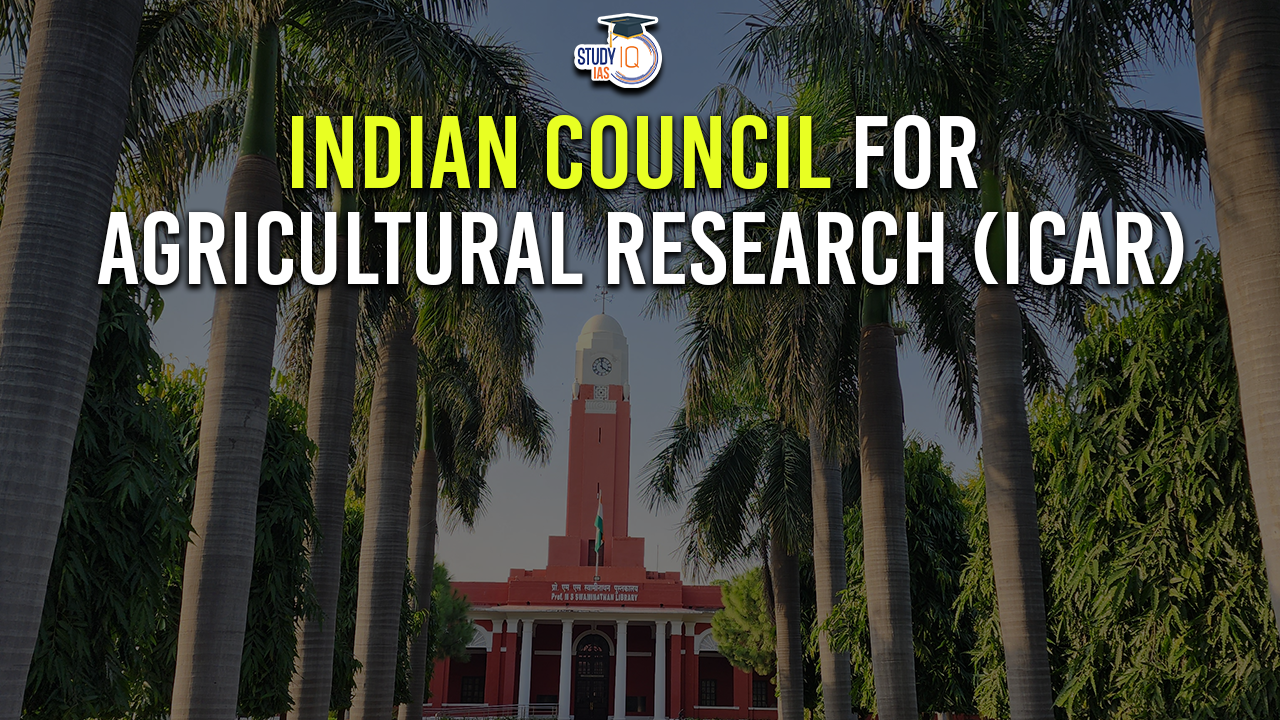Table of Contents
Context: The 97th Foundation Day of the Indian Council for Agricultural Research (ICAR)was celebrated in New Delhi, with the Union Agriculture Minister addressing both scientists and farmers.
The Indian Council for Agricultural Research (ICAR) is a premier national organisation responsible for coordinating and overseeing agricultural research and education in India. Established in 1929, ICAR has played a pivotal role in transforming the agricultural landscape of the country by promoting innovative research, developing high-yielding crop varieties, and implementing policies to enhance food security.
About ICAR – Indian Council for Agricultural Research
- Indian Council for Agricultural Research (ICAR) is India’s apex autonomous body for agricultural research, education, and extension.
- Founded: 16 July 1929 (as the Imperial Council of Agricultural Research).
- Reconstituted under: Societies Registration Act, 1860.
- Headquarters: New Delhi.
- Parent Body: Department of Agricultural Research and Education (DARE).
- President (Ex-Officio): Union Minister of Agriculture.
Major Initiatives at ICAR’s 97th Foundation Day
- Viksit Krishi Sankalp Abhiyan: India’s largest farmer-scientist dialogue.
- Identified 500 research areas based on regional and crop-specific needs.
- Field-Guided Research Agenda: Farmer-priority-based research with a “One Team, One Goal” model.
- Natural Farming Drive: Promotes chemical-free, eco-friendly farming practices.
- Fertilizer Testing Kits: Portable kits for farmers to check soil and input quality; aims to curb adulteration.
- Toll-Free Helpline: For reporting fraud in seeds and fertilisers; targets over 30,000 unregulated bio-stimulants.
- Ethical MoUs & Pricing Oversight: Mandates fair pricing in ICAR-industry agreements to safeguard farmer interests.
Historical Background of ICAR
- Establishment: ICAR was established as the Imperial Council of Agricultural Research in 1929. The organization aimed to promote agricultural research and education in the country.
- Post-Independence Reforms: After India gained independence in 1947, ICAR was restructured to focus on the country’s unique agricultural challenges, which included food shortages and the need for sustainable farming practices.
Objectives of ICAR
- Research and Development: To conduct, promote, and coordinate research in agriculture, horticulture, and animal sciences.
- Education and Training: To provide quality education in agriculture through agricultural universities and institutes.
- Extension Services: To disseminate research findings to farmers and stakeholders to enhance agricultural productivity.
- Policy Formulation: To support the government in formulating policies related to agricultural development and food security.
Key Functions of ICAR
- Research & Education: Coordinates R&D in agriculture, fisheries, animal husbandry, home science, agroforestry, etc.
- Extension Services: Disseminates innovations via publications, exhibitions, and outreach programs.
- Capacity Building: Conducts exams and recruitment through ASRB; supports agricultural education and skill training.
- Collaboration: Works with CSIR, BARC, and global partners for rural development and post-harvest tech.
- Policy Advisory: Assists the government in sustainable agriculture, innovation, and food security planning.
Structure of ICAR
ICAR operates through a network of research institutes and agricultural universities across the country. Its structure includes:
- Research Institutes: Over 100 research institutes focusing on specific areas of agriculture, such as crop science, soil science, and animal husbandry.
- Agricultural Universities: 73 agricultural universities that offer undergraduate and postgraduate programs in agricultural sciences.
- National Agricultural Research System (NARS): A collaborative network of ICAR and state agricultural universities, research organisations, and private sector entities.
Key Contributions of ICAR
- Green Revolution: ICAR played a crucial role in the Green Revolution of the 1960s, introducing high-yielding varieties of crops, advanced farming techniques, and irrigation methods that significantly increased food production.
- Research Initiatives: ICAR has initiated various research programs, such as:
- Integrated Farming Systems: Promoting sustainable agriculture by integrating crops, livestock, and fisheries.
- Climate-Smart Agriculture: Developing practices to mitigate the impact of climate change on agriculture.
- Biotechnology: Researching genetically modified organisms (GMOs) to enhance crop resistance and yield.
- Farmer Welfare Programs: ICAR implements programs like the Kisan Vikas Kendra (KVK) to provide training and resources to farmers, helping them adopt modern agricultural practices.
ICAR: Recent Developments
- Digital Initiatives: ICAR has embraced technology by launching platforms such as e-Krishi and Kisan Suvidha App, which provide farmers with timely information on weather, market prices, and best farming practices.
- Research on Biofortification: Focused on improving the nutritional quality of crops to combat malnutrition in India, ICAR is involved in research on biofortified crops like iron-rich wheat and zinc-rich rice.
Challenges Faced by ICAR
- Resource Constraints: Limited funding and resources hinder the implementation of extensive research programs.
- Climate Change: Adverse weather patterns pose a significant threat to agricultural productivity, necessitating more resilient farming practices.
- Technology Adoption: Ensuring farmers adopt modern agricultural techniques remains a challenge due to the digital divide and lack of awareness.


 Important Subject Quizzes Links: Boost Y...
Important Subject Quizzes Links: Boost Y...
 World Cancer Day 2026: Theme, Date, Hist...
World Cancer Day 2026: Theme, Date, Hist...
 List of Chief Guests on Republic Day Par...
List of Chief Guests on Republic Day Par...

























